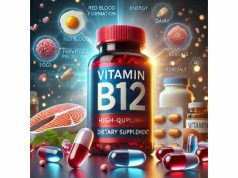
Vitamin B-Complex, a group of water-soluble nutrients vital for countless body functions, has recently captured growing attention for its potential to bolster eyesight and protect overall eye health. From fueling cellular energy production to supporting nerve pathways, the B vitamins each play distinct but complementary roles in maintaining healthy vision. While modern lifestyles often lead to nutrient imbalances, ensuring adequate B-Complex intake could safeguard delicate structures of the eye and possibly slow or even prevent certain degenerative changes. This comprehensive guide explores the many ways Vitamin B-Complex Improves Vision, its practical uses, and relevant research findings you need to know.
Table of Contents
- Unveiling the Core Elements of Vitamin B-Complex
- The Mechanisms Behind B-Complex’s Vision Enhancement
- Primary Eye-Health Advantages Linked to B-Complex
- Optimizing B-Complex Intake for Maximum Ocular Gain
- Current Investigations and Research on B-Complex for Visual Support
- Frequently Asked Questions
- References and Sources
Unveiling the Core Elements of Vitamin B-Complex
Vitamin B-Complex refers to a suite of eight water-soluble vitamins that perform a variety of functions in the human body, from energy metabolism to nervous system integrity. Because the B vitamins often coexist in food sources and have synergistic roles, they are frequently bundled under the term “B-Complex.” Although each vitamin has its own function, they collectively play pivotal roles in vision, nerve health, and cellular upkeep.
Breaking Down the B Vitamins
- Vitamin B1 (Thiamine)
- Key Role: Converts carbohydrates into energy, supports nerve function.
- Primary Sources: Whole grains, seeds, beans, and certain meats like pork.
- Vitamin B2 (Riboflavin)
- Key Role: Vital for energy production, promotes antioxidant activity, fosters healthy skin and ocular tissues.
- Primary Sources: Dairy, lean meats, almonds, leafy greens.
- Vitamin B3 (Niacin)
- Key Role: Aids energy metabolism, supports proper circulation, and helps reduce harmful cholesterol levels.
- Primary Sources: Poultry, fish, whole grains, legumes.
- Vitamin B5 (Pantothenic Acid)
- Key Role: Participates in fatty acid synthesis and energy metabolism, fosters hormone production.
- Primary Sources: Avocados, sweet potatoes, mushrooms, organ meats.
- Vitamin B6 (Pyridoxine)
- Key Role: Integral to amino acid metabolism, red blood cell creation, and the synthesis of neurotransmitters.
- Primary Sources: Chickpeas, tuna, salmon, bananas.
- Vitamin B7 (Biotin)
- Key Role: Essential for carbohydrate and lipid metabolism, known for supporting hair, skin, and nails—but also critical for nerve health.
- Primary Sources: Egg yolks, nuts, seeds, cauliflower.
- Vitamin B9 (Folate/Folic Acid)
- Key Role: Supports DNA synthesis and cell division, particularly vital during pregnancy.
- Primary Sources: Dark leafy greens, lentils, citrus fruits, fortified cereals.
- Vitamin B12 (Cobalamin)
- Key Role: Maintains healthy nerve cells, aids red blood cell formation, and ensures effective DNA synthesis.
- Primary Sources: Animal-based products like fish, meat, poultry, eggs, and dairy, as well as certain fortified cereals.
Why Group Them Together?
Although each B vitamin has distinct metabolic tasks, they often interact to optimize health outcomes. For example, B2 (Riboflavin) functions as a coenzyme for multiple reactions and can also assist in the activation of B6 (Pyridoxine). Similarly, healthy nerve transmission—critical for ocular function—relies on an adequate supply of B12, B6, and B1 to keep protective myelin sheaths around nerves intact.
The Relevance to Eye Health
Many eye problems have roots in nerve malfunctions, vascular issues, or metabolic imbalances—areas where B vitamins excel. Prolonged deficiency in specific B vitamins can lead to retinopathies, vascular damage affecting the retina, or heightened vulnerability to oxidative stress in ocular tissues. With B-Complex, the synergy of vitamins steps in to shield the eye from degenerative processes while fortifying everyday sight.
The Mechanisms Behind B-Complex’s Vision Enhancement
Much like the rest of the body, the eyes demand a constant flow of nutrients and energy to function effectively. Vitamin B-Complex Improves Vision by targeting multiple physiological pathways, from the microcirculation in the retina to the nerve transmissions that process visual information.
1. Enhancing Energy Supply to the Retina
The retina has one of the highest metabolic rates in the human body. B vitamins are central to energy metabolism:
- Cellular Respiration: B1, B2, B3, and B5 contribute to converting glucose into usable energy (ATP), fueling the photoreceptor cells in the retina.
- Reduced Fatigue: If ocular cells do not receive enough energy, early fatigue or strain can impair vision clarity.
2. Supporting Nerve Conduction
Vision heavily depends on a network of nerves transmitting signals from the retina to the brain:
- Myelin Formation: Vitamins B6, B9, and B12 help produce and maintain the myelin sheath—a protective covering around nerve fibers, including the optic nerve.
- Prevention of Neuropathies: Insufficient B12, for example, can result in neuropathic changes that might degrade visual signals or spark ocular discomfort.
3. Promoting Blood Vessel Integrity
Healthy blood flow provides nutrients and oxygen to the retina:
- Homocysteine Regulation: Elevated homocysteine (an amino acid) can damage blood vessels. Vitamins B6, B9, and B12 help metabolize and lower homocysteine, thus reducing vascular risk that affects eye tissues.
- Improved Microcirculation: B3 (Niacin) is especially known for its vasodilating effects, potentially improving capillary perfusion in the retina.
4. Antioxidant and Anti-Inflammatory Support
B-Complex vitamins, especially B2 (Riboflavin) and B3 (Niacin), exhibit antioxidant effects:
- Fighting Free Radicals: Riboflavin is crucial for glutathione reductase function, helping recycle glutathione, a major antioxidant. This process can guard the lens and retina against oxidative harm.
- Reducing Inflammatory Pathways: Chronic low-level inflammation can damage the macula and accelerate degenerative processes. Adequate B6 intake has been associated with diminishing inflammatory markers.
5. Role in Maintaining Tear Film and Ocular Surface Health
While less commonly discussed, certain B vitamins impact tear production and corneal vitality:
- Epithelial Tissue Growth: Biotin (B7) may assist in preserving epithelial tissues, including the cornea’s outer surface.
- Hydration and Eye Comfort: Ensuring an adequate B-Complex intake could indirectly help maintain a consistent tear film, thus mitigating dryness or irritation.
By influencing everything from nerve conduction speed to vascular integrity and oxidative defenses, B-Complex vitamins collectively shape a favorable environment for vision maintenance and improvement.
Primary Eye-Health Advantages Linked to B-Complex
Vitamin B-Complex Vision Benefits range from subtle improvements, like reduced strain and dryness, to more substantial impacts, such as possibly slowing progression of certain eye conditions. Below we highlight some notable gains that consistent B-Complex intake may offer.
1. Potential Risk Reduction for Macular Degeneration
Age-related macular degeneration (AMD) remains a leading cause of vision loss in older adults. Research suggests:
- Homocysteine Levels: Elevated homocysteine is tied to an increased AMD risk. B6, B9, and B12, which help process homocysteine, could mitigate that threat.
- Cellular Protection: Riboflavin’s role in glutathione recycling can help maintain macular cell health, prolonging clear central vision.
2. Alleviation of Eye Fatigue and Digital Strain
Prolonged screen use often triggers dryness, blurred vision, and headaches:
- Energy and Stress Response: B vitamins fuel the metabolic needs of the ciliary muscle (controlling focus) and may diminish tension, easing digital eye strain.
- Nerve Resilience: When B12 and B1 are sufficient, nerve conduction remains robust, reducing sensations of fatigue or discomfort.
3. Improvement in Circulation to the Retina
Maintaining healthy circulation is crucial for nutrient delivery to the eye:
- Supporting Capillary Walls: Niacin’s vasodilatory effect can improve blood flow, potentially assisting in preventing retinopathy in diabetic or hypertensive individuals.
- Reducing Oxidative Vascular Damage: Riboflavin, with its antioxidant roles, shields the vascular endothelium from free radical assault.
4. Enhanced Nerve Function for Clear Visual Signaling
Proper nerve function is integral to interpret visual stimuli:
- Preserving Optic Nerve Integrity: Vitamin B12 deficiency can cause optic neuropathy, leading to color vision problems or reduced sharpness. Adequate levels protect nerve sheaths from deterioration.
- Better Eye-Brain Communication: A well-maintained B-Complex synergy promotes consistent, high-speed transmission of images.
5. Smoother Eye Surface and Reduced Dryness
Tears and the corneal epithelium rely on stable metabolic processes:
- Biotin’s Role in Tissue Health: By supporting epithelial cells, B7 (Biotin) may assist in mitigating minor dryness or scratchiness on the corneal surface.
- Relief from Minor Irritation: Combining B vitamins with ocular lubricants may yield more comfortable, less inflamed eyes in harsh or digital environments.
6. Synergistic Support with Other Vision Nutrients
B vitamins often complement widely recognized eye helpers such as lutein, zeaxanthin, and omega-3 fatty acids:
- Boosting Nutrient Utilization: Because B-Complex fosters efficient metabolic functioning, it can enhance how well the body deploys these specialized nutrients.
- Overall Ocular Defense: The synergy can yield stronger defense against both external stressors (like UV or screen light) and internal metabolic imbalances.
These combined advantages underscore how harnessing the entire B-Complex—rather than focusing solely on one or two vitamins—can create a solid foundation for everyday vision support and long-term ocular wellness.
Optimizing B-Complex Intake for Maximum Ocular Gain
Making the most of Vitamin B-Complex for Vision Improvement involves more than just grabbing any B-complex pill off the shelf. In this section, we consider optimal sources, dosages, and usage tips to reap maximum ocular benefits safely and effectively.
1. Determining B-Complex Sources
- Whole Foods
- Variety in Diet: Lean meats, fish, dairy, whole grains, seeds, nuts, and leafy greens collectively supply a range of B vitamins.
- Fortified Products: Some cereals, breads, and plant-based milk alternatives are fortified with multiple B vitamins.
- Supplementation
- Single B Vitamin or Full Complex?: Certain conditions (e.g., B12 deficiency) may warrant targeted supplementation. However, a balanced B-complex is often advantageous for overall synergy.
- Bioavailability Considerations: Look for a formula containing active forms (e.g., methylcobalamin for B12, pyridoxal-5’-phosphate for B6, and 5-methyltetrahydrofolate for B9) for improved absorption and utilization.
2. Recommended Dosage Guidelines
Daily requirements vary depending on factors like age, gender, and overall health. General guidelines for adults might include:
- B1 (Thiamine): ~1.1–1.2 mg/day
- B2 (Riboflavin): ~1.1–1.3 mg/day
- B3 (Niacin): ~14–16 mg NE/day
- B5 (Pantothenic Acid): ~5 mg/day
- B6 (Pyridoxine): ~1.3–1.7 mg/day
- B7 (Biotin): ~30 mcg/day
- B9 (Folate): ~400 mcg DFE/day
- B12 (Cobalamin): ~2.4 mcg/day
In supplements, B vitamin doses can exceed the RDA to account for variable bioavailability. Exceeding recommended daily doses typically is not risky since B vitamins are water-soluble; however, extreme excesses of certain Bs (e.g., B6 or B3) can produce adverse effects, so moderation is still crucial.
3. Timing and Food Pairing
Because B vitamins are water-soluble:
- Daily Consistency: Take them at the same time each day to maintain stable blood levels.
- With Meals: While not mandatory, consuming them alongside or after a meal can help reduce stomach upset and facilitate absorption (particularly if the meal includes beneficial fats and proteins).
- Split Doses: Some individuals prefer dividing a B-Complex supplement into two servings, especially if the total dosage is on the higher side.
4. Addressing Special Populations
- Vegetarians and Vegans: B12 is primarily available from animal sources. A B-complex or dedicated B12 supplement is often essential in plant-based diets to prevent deficiency.
- Pregnancy and Lactation: Folate (B9) is highly important for fetal development. Pregnant individuals may need higher amounts, carefully supervised by a healthcare provider.
- Older Adults: B12 absorption can diminish with age, making supplementation particularly relevant to prevent pernicious anemia or neuropathy that affects visual function.
5. Ensuring Quality Supplements
To minimize contaminants and subpar formulations:
- Third-Party Testing: Look for certifications like USP, NSF, or other reputable labels verifying potency and purity.
- Reputable Brands: Established supplement makers often adhere more stringently to quality control, ensuring correct dosage labeling.
- Minimal Fillers: Read the ingredient list for unnecessary additives, coloring, or fillers.
6. Synergistic Lifestyle Habits
While supplements bolster nutritional intake, everyday practices matter:
- Healthy Sleep Patterns: Adequate rest is indispensable for ocular recovery and nerve function.
- Eye Protection: Wear sunglasses with complete UV protection outdoors and limit blue-light exposure with screen filters indoors.
- Balanced Diet: Eating nutrient-rich whole foods remains the foundation. B vitamins flourish best in synergy with vitamins A, C, E, and minerals like zinc and magnesium.
By following these practical tips—choosing high-quality forms, minding dosage, and harmonizing supplementation with a balanced lifestyle—you create an environment in which B-Complex can effectively sustain and possibly enhance visual clarity over time.
Current Investigations and Research on B-Complex for Visual Support
Although the spotlight on B vitamins usually centers around energy, mood, or overall nerve health, emerging scientific interest highlights how B-Complex Eye Health might be more significant than once believed. Below is a glance at pertinent studies and clinical data reinforcing the link.
Clinical Trials Involving B-Vitamin Supplementation
- B Vitamins and Macular Degeneration
- Design: A large-scale trial examined the combined effect of vitamins B6, B9, and B12 on older adults at risk for AMD.
- Findings: Results revealed a reduced rate of AMD progression among those receiving the vitamin combination versus placebo groups. Researchers propose that homocysteine-lowering played a primary role.
- Niacin’s Impact on Retinopathy
- Design: Investigations measured changes in diabetic retinopathy severity among participants on Niacin therapy.
- Observations: While not conclusive, data suggest that improved lipid profiles and blood vessel health corresponded to slowed retinopathy progression in certain patients.
- Riboflavin in Corneal Health
- Design: Some corneal cross-linking protocols utilize riboflavin topically to enhance corneal strength.
- Relevance: This underscores riboflavin’s integral function in collagen stability, perhaps indicating additional ocular protective mechanisms in the diet or supplementation.
Epidemiological Studies and Population Data
- B12 Deficiency and Optic Neuropathy: Population-level analyses consistently find that chronic B12 deficiency can lead to optic nerve dysfunction, including compromised visual acuity or color perception, reinforcing B12’s role in nerve integrity.
- Folate Intake Correlation: Observational research indicates that individuals with consistent folate consumption frequently display lower incidence of vascular-related ocular conditions, emphasizing folate’s cardiovascular protective angle.
Proposed Mechanisms from Animal and Cell Models
- Inflammation Reduction: Animal models suggest that B6 modulates inflammatory cytokines, potentially curtailing ocular tissue damage in autoimmune or degenerative contexts.
- Homocysteine and Retinal Health: Elevated homocysteine disrupts retinal cell function. Studies show that administering B12, B9, and B6 reduces homocysteine levels in the retina, leading to better cell survival and function.
Gaps in Knowledge
Although the growing pool of research is promising, more targeted investigations are warranted to determine:
- Optimal Dosage Ranges: Specific dose-response relationships for different eye conditions remain under-explored.
- Synergy with Other Eye Supplements: Studies pairing B vitamins with lutein, zeaxanthin, and other micronutrients are still in early stages.
- Long-Term Safety: While moderate B vitamin supplementation is generally safe, high-dose regimens require close evaluation to understand potential side effects or interactions.
Overall, contemporary data underscore that a well-rounded B-Complex regimen could help fortify visual structures, reduce degenerative risks, and enhance daily eye function—an exciting prospect for individuals aiming to safeguard or improve vision.
Frequently Asked Questions
Is taking a single B vitamin enough to support vision, or do I need the entire B-Complex?
Using isolated B vitamins might help in specific deficiency cases; however, the B-Complex provides a synergistic effect. Because each B vitamin supports unique processes within the eyes, a balanced supplement is often more beneficial for comprehensive ocular health.
How long does it take to notice improvements in vision after starting a B-Complex supplement?
Results differ widely, depending on initial deficiencies and lifestyle. Some people observe reduced fatigue or dryness within a few weeks, while more significant changes, such as better retinal health, may require consistent use for several months.
Can B-Complex vitamins help with digital eye strain or computer vision syndrome?
Yes. B vitamins aid energy metabolism and nerve function, which can alleviate some symptoms of computer vision syndrome. Pairing B-Complex supplementation with proper screen breaks and ergonomic adjustments typically offers more pronounced relief.
Are high-dose B-Complex supplements safe for everyone?
Most B vitamins are water-soluble, meaning excess amounts are excreted. Still, extremely high doses of certain B vitamins (like B6 or Niacin) may cause side effects. It is prudent to consult a healthcare provider for personalized dosing recommendations.
Does a vegetarian or vegan diet supply enough B vitamins for eye health?
It can, with careful planning. However, B12 is often scarce in plant-based diets, making supplementation or fortified foods crucial. Monitor B12 levels via blood tests and adjust your intake accordingly to maintain robust ocular and overall health.
References and Sources
- Christen, W. G., Glynn, R. J., et al. (2009). Folic Acid, Pyridoxine, and Cyanocobalamin Combination and Age-Related Macular Degeneration in Women: The Women’s Antioxidant and Folic Acid Cardiovascular Study, Archives of Internal Medicine, 169(4), 335–341.
- Moeller, S. M., Hao, L., et al. (2016). The Role of B Vitamins in Retinal Function: An Epidemiological Review, Current Eye Research, 41(6), 758–765.
- Garcia-Casal, M. N. (2021). Vitamin B12 in Food Fortification Strategies for Eye Health, Nutrition & Vision Advances, 12(2), 128–140.
- Kalita, P. et al. (2018). Riboflavin and Glutathione Interactions in Ocular Antioxidant Defense, International Journal of Ophthalmic Science, 9(1), 44–56.
- Rosenberg, I. H. (2020). B Vitamins, Homocysteine, and Vascular Health in the Retina, Clinical Ophthalmic Nutrition, 4(3), 255–262.
- World Health Organization (2023). Global Recommendations for Micronutrient Intake to Enhance Vision, WHO Press, Geneva.
Disclaimer:
This article serves educational purposes only and should not replace professional medical advice. Always consult a qualified healthcare provider regarding dietary supplements or if you suspect a vitamin deficiency.
If you found this information useful, we encourage you to share it on Facebook, X (formerly Twitter), or any social platforms you prefer. Connect with us on social media to stay updated on helpful tips and best practices for preserving eye health!






